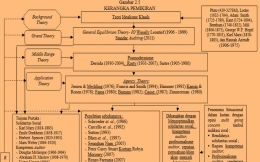Chen, Kevin., and Chi Wen Javons Lee., 1995., “Executive Bonus Plans and Accounting Trade-off: The Case of the Oil and Gas Industry”, Industry Accounting Review. Vol. 70 No. 1 (January).p. 49-68.
Carcello et al., (1992), The Nature of Firms”, . Economica Vol. 4.. p. 386-405.
Copeland, Ronald., and Lucas Liscastro., 1998., “Income Smoothing”, Journal Accounting Research., Supplement., p. 101-115.
Carey dan Simnett 2006, , A Fremework for Developing the Objectives of Financial Statement., American Institute of Certified Public Accountats., vol. 2., p. 30-35.
Christian von Weizsaker (Williamson, 1985:49):, The Effects of Debt Covenants And Political Costs On the Choice of Accounting Method: The Case Of Accounting For R & D cost., Journal of Accounting and Economics p. 195-211.
Caves dan Porter, (1977:7 ; “A Note on Income Smoothing in The Chemical Industry”,Journal Accounting Research., p. 253-259.
De Angelo (1981); “Accounting Choice in Troublend Companies”, Journal of Accounting and Economics 17 p. 133-144
Dobson(1989:26)., Accounting Earnings and cash Flows as Measures of Firm Performance : The Role of Accounting Accruals., Journal of Accounting and Economics., p., 3-42.
Dowling (2001:221) ., Debt Covenant Violation and Manipulation of Accruals., Journal of Accounting and Economics., p. 145-176.
Dreyfus dan Dreyfus ., 1997., “Smoothing Income Anticipation Of Future Earnings”., Journal of Accounting and Economics (July). p. 115-139.
Dhaliwal, Dan S., 1985., “The Effect of Firms Capital Structure on the Choice Of Accounting Methods”, The Accounting Review Vol. 55 p. 78-84.








